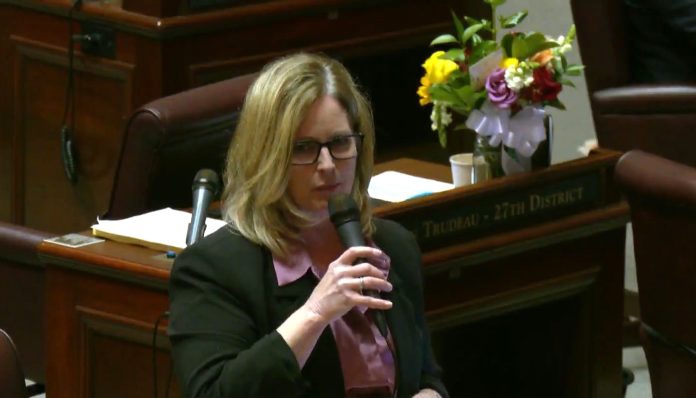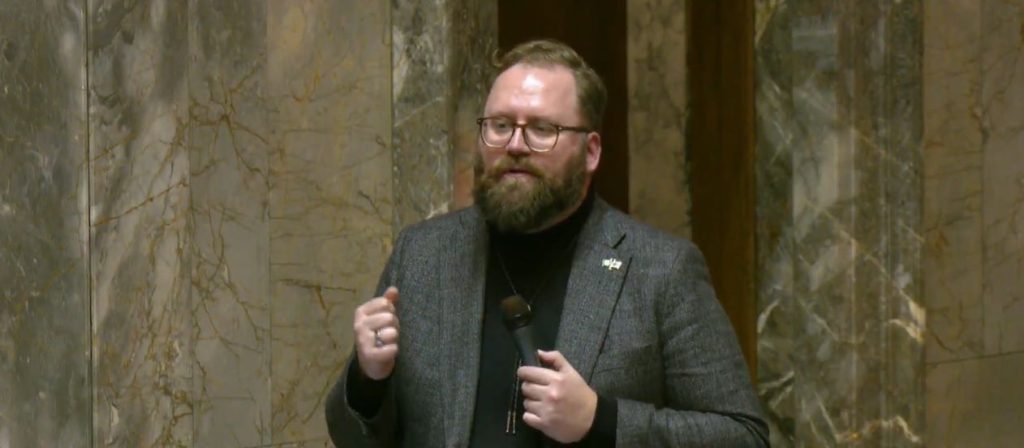
On Thursday, the Washington State Senate took the leap and approved a long-awaited rent stabilization bill, but not before gutting it with provisions that quickly earned the ire of tenant advocates, who are arguing they kneecapped the legislation close to the point of uselessness. Those amendments set up a potential fight between the Senate and the House in the days ahead.
House Bill 1217 had already cleared the state House in March, with only five Democratic votes in opposition. The 29-20 vote in the Senate was also along party lines, with only Sen. Annette Cleveland (D-49th, Vancouver) joining Republicans in opposition. However, a contingent of more conservative Democrats did support a slew of amendments that weakened the legislation.
The bill came over from the state House with a flat 7% cap on rent increases, but Sen. Sharon Shewmake (D-42nd, Bellingham) succeeded in amending the bill to give landlords more leeway to raise rents a full 10% plus inflation as determined by the Consumer Price Index (CPI). Inflation was about 3% in 2024, but spiked near 10% in 2021 and 2022, when inflation was high. Rachael Myers of the Washington Low Income Housing Alliance, which backs the original bill, sharply criticized the amendment in an email to supporters.
“For context, this amendment would have allowed an increase of 13.4% in 2024, 14.6% in 2023, 18.9% in 2022,” Myers wrote. “Rent increases this high would fuel displacement, evictions, homelessness, and gentrification.”
A law that could allow 18% rent hikes in high inflation times is not going to feel like stability to most tenants. It would function more like a rent gouging bill, only limiting the steepest increases. In fact, Shewmake acknowledged her intent was to only go after extreme rent gouging and instead rely on market-focused interventions to bring down prices overall.
“I do not want to see a 10% plus CPI rent increase year after year,” Shewmake said during floor debate. “I know families can’t afford that. But what this does, is it prevents rent gouging, and what we really do to build a more successful, more dynamic market is we make sure that we’re doing things like removing barriers, removing parking minimums, allowing for permitting to happen in more places, and doing that important supply work and building an economy that works for everyone.”
The change came down to a razor-close 25-24 vote, with Democratic Senators Adrian Cortes (18th, Battle Ground), Marko Liias (21st, Mukilteo), John Lovick (44th, Mill Creek), and Jesse Salomon (32nd, Shoreline) joining Shewmake, Cleveland, and the Republican caucus in supporting the amendment. The passage of Shewmake’s amendment came as a complete surprise to the Senate’s Democratic caucus, which quickly scrambled to figure out whether the new bill had majority support among the group of 30 Senators.
After checking the tape, here were the Democratic yes votes on the 10% plus CPI amendment. Cleveland, Cortes, Liias, Lovick, Salomon, and Shewmake All voted for the final bill except Cleveland.
— Ryan Packer (@typewriteralley.bsky.social) April 10, 2025 at 5:30 PM
[image or embed]
The Senate also expanded exemptions, leaving more tenants unprotected. An amendment by Liias will exempt single family homes, which compose about 30% of rental stock. The amendment seeks to shield corporate-owned single family homes from the exemption, but tracking of such homes is limited, making enforcement tricky.
Liias said he modeled his amendment after California’s rent stabilization law, arguing stabilizing rents in single family homes would drive those smaller time landlords out of the market — conceivably selling rather than renting those homes.
“I’m sad to report the data in Washington show that the number of single family homes that are renter occupied is declining,” Liias said. “In fact, just over the last four years, 17,000 fewer homes statewide in Oregon, where we have seen the underlying policy imposed. That trend has continued after stabilization has been enacted.”

Liias did not say whether Washington’s decline in single family home rentals was less than in rent stabilized Oregon. Regardless of whether rent stabilization was the determining factor in single family home rental trends, Liias succeeded in passing his amendment in another 25-24 vote.
The coalition behind rent stabilization has vowed to fight to claw back the senate amendments. The Washington Low Income Housing Alliance is pushing a form letter asking representatives to do just that.
“But this isn’t the end,” Myers wrote. “The bill now heads back to the House, and there is still time to strengthen it and reverse the harmful changes made in the Senate.”
Michele Thomas of the Washington Low Income Housing Alliance has also pointed out that large-scale landlords are spending heavily and apparently breaking lobbying rules as they campaign against rent stabilization, including in a recent Urbanist op-ed.
Another amendment from Annette Cleveland that would have wiped out local renter protections across the state that go further than the bill just BARELY failed.
— Ryan Packer (@typewriteralley.bsky.social) April 10, 2025 at 4:23 PM
[image or embed]
Another amendment from Cleveland that would have superseded a wide variety of local rental protections across the state failed by a narrow 23 to 26 vote. Ironically, the rent stabilization bill nearly turned into a bill gutting renter protections across the state to appease a member who didn’t even vote for the underlying bill. Cleveland, Liias, Lovick, and Salomon supported that move.
Rent stabilization lead sponsor Emily Alvarado (D-34th, West Seattle) spoke forcefully against the Cleveland amendment.
“What this amendment does is eliminates all landlord tenant protections across the state,” Alvarado said. “So in cities like Seattle or in Aberdeen or in Tacoma or in Everett or in Kenmore, if your city has decided that you deserve some kind of protections as a tenant, this would make them go away. That’s not nice. Tenants aren’t confused by the law. Tenants are confused by the rent increases.”
After Democratic party leadership declared rent stabilization a top legislative priority in 2025, a handful of their members apparently didn’t get the memo. Unfortunately, this contingent was just enough to gut the bill in the senate. But the fight is not yet over, as the House gets to weigh in on the changes. Less than two weeks remain for the two chambers to work out their differences, but Washington tenants are depending on the result.
The Urbanist has backed rent stabilization as part of our advocacy agenda.



